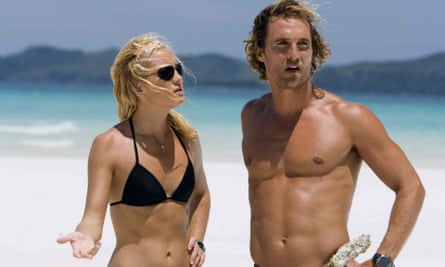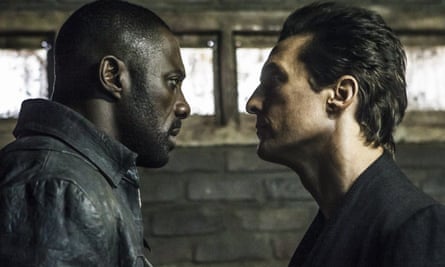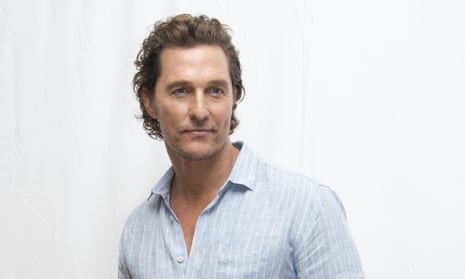At this point, the sight of Matthew McConaughey scuffed up and scuzzy, without a tan but with a shirt, is no longer a shock. It has been seven years since the McConaissance that saw the actor stop (or, at least, curb) toplessness to be consciously reborn as a grizzled character actor.
But what remains surprising is just how low – or rather high – he is now willing to go. Previous roles of the McConaissance (“I don’t mind the word,” he grins. “It’s got a good metre”) have seen him embrace fried-chicken greased vileness (trailer-trash thriller Killer Joe), pot-bellied greed (mining saga Gold) and life as an emaciated rodeo redneck (Aids drama Dallas Buyers Club). But they have still always been heroes on some level, even if there are a lot of caveats. Underneath it all, they are winners.
White Boy Rick is the first time that is not the case. McConaughey’s character – a single father in 1980s Detroit struggling to keep his family together as his son falls deeper into a drug-dealing underworld – sports a jacket so musty you can almost smell it from the stalls. Richard Wershe Sr spearheads a string of schemes predestined to fail. This is a man repeatedly – and convincingly – referred to as a loser.
“I didn’t choose to play the loser,” drawls McConaughey amiably in Toronto earlier this autumn. “I played a guy who’s trying to win but doesn’t. You can’t fault him for not being a hustler and a guy with some endurance but he’s ill-equipped, man. He’s living on hopes and dreams of the future but he’s fricking paralysed in the present.”
Such empathy with his character is understandable. At some point in the mid-2000s, McConaughey also felt trapped. Smugly flirting his way through a decade of films such as How to Lose a Guy in 10 Days, Failure to Launch, Fool’s Gold and Ghosts of Girlfriends Past had given him repetitive romcom strain. “The things that were really interesting me, I wasn’t getting offered.” But unlike Welshe, he had the confidence, the agency and the cash to end his stasis.

His agent was instructed to send him only glamour-free, small-budgeted scripts. Before long, his mantlepiece was groaning (an Oscar, a Globe, a Gotham, a Screen Actors Guild award for Dallas Buyers Club, an Independent Spirit award for Magic Mike, another for Mud, a New York Critics Circle gong for Bernie, endless nominations – and a few wins – for his existential cop in the first season of True Detective).
McConaughey didn’t just prove to the world he could act – or preemptively extend his professional sell-by date. He also managed to nix the notion that People’s Sexiest Man Alive 2005 was a vain clotheshorse. Face to face, he still looks like a matinee-era cowboy, hair and stubble at perfect length, tan intact, shirt buttons more undone than not. This is a guy who definitely still surfs at the weekend. During his comeback, he has been careful to play down those pin-up chops, or at least slather them in unfortunate facial hair – though he is at pains to stress it is not a conscious rejection.
“I was not running from anything, I was running to,” he says. At times, McConaughey seems to channel a particularly convincing self-help audiobook. “This is just the next chapter. I didn’t go seeking. I didn’t go: ‘I want roles where I can really transform, I want roles where I can get skinny or fat.’ You look at the character and I go: ‘Well, who is that?’”

In getting to grips with such a motley crew, the actor has enormously broadened his brand – and audience. From playing an oiled-up veteran stripper in Steven Soderbergh’s Magic Mike to a closeted, fetish-loving gay reporter in Lee Daniels’ bizarre potboiler The Paperboy, he has embraced a fluidity that happily expands an on-screen sexuality previously wasted with beefcake womanisers. Meanwhile, he has kept a finger in the mainstream via the likes of Sing and Interstellar. Rare is the cinemagoer – multiplex or arthouse, all genders, all sexualities – who doesn’t admire him.
He has simultaneously become one of the most prominent Christian actors in Hollywood, expressing passionate gratitude to God when accepting his Oscar (“He’s graced my life with opportunities that I know are not of my hand”), speaking in 2014 about the importance of viewing his marriage “spiritually”, then, two years later, claiming that “mankind has bastardised religion”. Yet he’s also, somehow, a pro at flogging luxury watches, and a creative director for Wild Turkey, the Kentucky bourbon distillery. It’s a slick, nuanced rebrand, a tightrope walk of morality that can make him seem alternative or conservative, depending on the circumstance.
His involvement in White Boy Rick is born partly from social conscience. Along with his wife, Camila, with whom he has three children under 11, he set up the Just Keep Livin’ foundation, “dedicated to helping teenage kids lead active lives and make healthy choices to become great men and women”. That means not embarking on the kind of choices made by the real-life Rick, who, after heading deeper into criminality, became the FBI’s youngest-ever informant before heading to jail, where he remains to this day, the longest-serving non-violent juvenile offender in Michigan’s history – which is where McConaughey visited him.
“I’ve talked to many people in prison,” he says, “and most of them say they’re innocent. Not him. But he said there have been people who sold a lot more than he did who came in after him and are already out. There are murderers who have come in and got out; the math of the sentence does not add up with the crime committed.”
Does McConaughey think Wershe’s sentence reflects a system that punishes non-violent drugs offences too harshly? Or was Wershe an exception?

“Oh, man,” he says, “I don’t know how equipped I am to answer that. Look: on a personal level, I know and understand that consequences can and do help people decide to take the right path. At the same time, you gotta look at it in a different way and say, ‘Well, let’s look at where is this happening. Who are the repeat offenders? How much are people a victim of what they’ve already inherited and all they know?’”
So far, so circumspect. But for a man only a year off 50, McConaughey can seem – as well as look – remarkably youthful. His enthusiasm is puppyish, positivity on full-beam: “I see the bright side of everything,” he says, randomly, at one point. He asks me how old I am.
“See, you’re 34 and I’m 49 but I’d still call you ‘sir’,” he laughs. “I find myself doing that still. I have more people that come and want me to share my experiences now than I did before. And I go: ‘Yeah, OK, I guess I’ve been doing this for 26 years. Oh yeah, I’m a father of three. Oh yeah, I do have some experience under my belt.’
“In life in general – but also specifically in our business – there’s an initiation process and people don’t just let you in. I didn’t have many people let me in on some things and years later I’m going: ‘Come on, man, you could have just told me that; it took me seven years to figure it out!’”
McConaughey, a media studies graduate from Austin, Texas, was 23 when he got his breakthrough: he was spotted by Richard Linklater in a TV ad for the local paper. The director cast him in Dazed and Confused in 1992 – a hugely significant and splashy first role – and an enduring cult film. But the road was rocky: his father died during filming and four years of ropy horror and crime procedural TV followed before a followup breakthrough, in the John Grisham adaptation A Time to Kill. While his first film showcased a knack for playing the slacker, his second allowed him to demonstrate a more refined southern charm and courtroom command. Suddenly, there came a flood of scripts – but again, he found himself at sea. “The discernment was a challenge at that point,” he says, drily.

There were unusual, often ill-advised choices. Despite his credentials as a leading man, he opted for smaller roles in Steven Spielberg’s Amistad, Robert Zemeckis’s faith-based sci-fi Contact and Linklater’s heist flop The Newton Boys. He regrets passing on Guy Pearce’s role in LA Confidential, and he auditioned for the part of Jack in Titanic and was bereft to lose it to Leonardo DiCaprio.
The McConaissance, too, has not been without its blips. In 2015, there was Gus Van Sant’s lethargic, Cannes-booed disaster The Sea of Trees, which was never released in the UK. Gold, the 2016 crime drama, was pure distilled Oscarbait that never saw even the glimmer of an award. The American civil war epic Free State of Jones, from the same year, was a project close to his heart that few audiences cared for; last year, the reviled franchise non-starter The Dark Tower came and went.
It’s hard not to start wondering what comes after a renaissance. Might it even be time for a new era in his reinvention? After all, he’s the first to admit to consistent career wobbles. The gap between screenplay and finished film is such a gripe he teaches a class of his own creation at the University of Texas called Script to Screen. He won’t name names, he says, but naivety about what can happen to a performance is “absolutely” something that has burned him in the past.
“I’ve given this advice: don’t do press junkets or talk about the film until you’ve see it. I’ve done that before and I went and saw the movie and I was like: ‘Every interviewer I’ve talked to must have been thinking, what fricking movie is he talking about?’’
You can see why such embarrassment would pique him: this is a man who likes to pride himself on good, old fashioned honesty. “I mean,” he says, stumbling for the first time in our meeting, “I’ve have never been in a film or given a performance that was as good as I’d hoped it would be.” He pauses, carefully and cautiously delivering what feels like a fresh realisation. “I’ve come close. I’ve seen some that are close. The movie that was closest to the script that I’ve ever been a part of is Mud. There was like one scene different and the dialogue is almost exactly what Jeff Nichols wrote.”

The dreams have always been better than the reality, he thinks. “I’ve never done [a film] that’s lived up to what I imagined it could be.” He softens the blow for his peers, while keeping things strict for himself. “I’ve been a part of a bunch of films that I highly respect and really have a love for and think are great. And I’ve done performances that I’m very happy with and I’m like, ‘Good job, McConaughey!’ But nothing that I’ve ever thought …” He tails off – he can’t seem to bring himself to articulate what real excellence might be like. “And I don’t think I’ll do one that does.”
He’s not being too hard on himself? There’s that Oscar, after all …
“Hard enough! I wouldn’t say too hard!”
But his forthcoming projects seem, on the face of it, unlikely to offer the opportunity to achieve what he wants. He’s a fisherman seduced by Anne Hathaway in the noirish, yacht-set thriller Serenity; then comes Harmony Korine’s comedy The Beach Bum; then Toff Guys, Guy Ritchie’s return to the gangster genre.
Still, if McConaughey is drifting, he is, at least, cheerful about it. “I’m still getting off on acting,” he says. “I’m not bored at all. Acting is like a working vacation for me. I can’t wait to go to work. I’m scared about it, I love it. I love the adrenaline of it. I’m confident with it. I’m surprised with it. It spooks me in a good way.”
He continues evangelising. “I really like the adventure and experience of diving into it. It’s an excavation. It’s a construction. It’s architecture, building something. I’m happy. I look forward to it. I don’t make many films my kids can see yet but I look forward to them one day looking at my stuff and going: ‘Oh, I see what Dad was doing!’”
And if anything might spur him back to pre-McConaissance fodder, it’s surely this. “Yeah,” he grins again. “We’re not sitting them down with Killer Joe any time soon.”

Comments (…)
Sign in or create your Guardian account to join the discussion